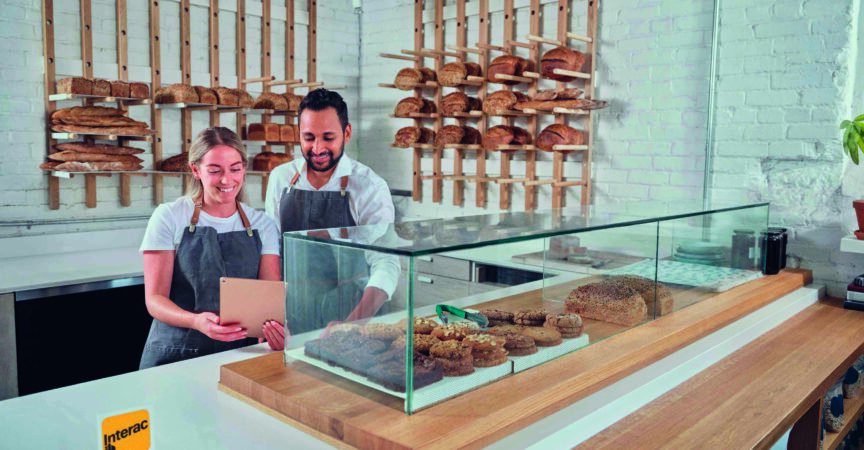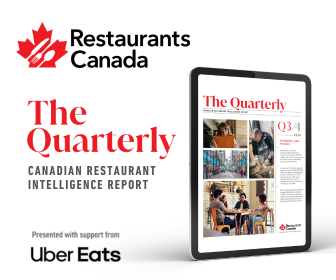The Pace of Payments in Canada’s Restaurant Industry
The impact of the COVID-19 pandemic on the restaurant industry is still being felt across the country. Despite the hardships faced by the sector at the onset of the pandemic, the restaurant industry has shown resilience and adopted new ways of doing business. Some restaurants have expanded their services, altered menus, shifted their business models and supply chains, while either equipping themselves with Plexiglas partitions to safely serve customers or pivoting to provide takeout and more ecommerce-driven offerings.
A key driver for these changes is consumer behaviour and the new ways through which Canadians are interacting with restaurants, as well as businesses at large. Many are reducing their use of cash as a payment method and are relying instead on digital payments. In fact, an Interac survey revealed that two-thirds of Canadians surveyed believe businesses that fail to adapt in order to allow digital payments will struggle.
Looking ahead towards a post-pandemic economy, the demand for digital payment options from businesses will only increase. With every dollar counting more than ever before given the challenges faced by businesses during the pandemic, efficient ways of paying and managing finances in ways that improve cash flow is now paramount. Improvements to accounts payables, accounts receivables, and methods of payment cannot be overlooked in this recovery-focused environment.
Eight in 10 (80 per cent) business decision-makers surveyed agree that moving from traditional payment options to digital ones will be essential to post-pandemic growth.
Pre-pandemic, day-to-day financial management often involved processes that were paper-based, cheque-driven and manual. These are typically slow and inefficient ways of working and require businesses to spend valuable resources processing and reconciling payments. The pandemic, alongside changing consumer preferences, has naturally reinforced the need for digitization and moved businesses to lessen their reliance on manual processes in an effort to boost overall operational efficiency. Eighty-three per cent of finance professionals surveyed by Interac affirm this notion, saying that applying digital transformation to their function is now a priority.
These needs are fuelling demand for innovative business payment solutions, such as Interac e-Transfer for Business. An enhancement of the existing Interac e-Transfer service, this tool was built to meet the needs of Canadian businesses and offers higher transaction limits up to $25,000 depending on your financial institution, fast money transfers with instant confirmation and rich remittance data, allowing businesses to reconcile transactions with less paperwork.
In other words, it can help streamline accounting processes and accelerate a paperless office strategy.
For those in the restaurant or franchise business specifically, this could mean being able to make just-in-time supplier payments as these payments would be confirmed and deposited within five seconds, minimizing the likelihood of late payments and maximizing eligibility for supplier discounts. Further, businesses could settle bill payments for regular expenses such as rent or utilities more efficiently.
From an internal standpoint, it could mean the ability to manage payroll or gratuity payouts in real-time, with employees receiving payments or tip-outs at the end of shift, maximizing cash-flow for the employee and employer alike with flexible routing options. These payments could also be made using an email, SMS or account number.

In practice, the flexibility of Interac e-Transfer for Business has shown to meet a variety of payment needs when put to use. For example, Interac e-Transfer for Business made it easy for one Canadian restaurant to collect food delivery payments while simultaneously serving the needs of their tax-exempt customers. Given some third-party food delivery apps are unable to remove sales tax from orders at present, the restaurant of a local inn signed up for Interac e-Transfer for Business to offer a payment solution to their customers. By enabling the service, they were able to receive payments instantly while serving the unique needs of their community.
Receiving payments instantly in this way can also be a game-changer if a business is largely reliant on cheques, as there can often be uncertainty around whether a cheque will clear or when it will arrive in the mail. This is exactly the case for one Canadian food co-op which deals with customers that pay for products upon delivery via cash or cheque. However, in instances where customers do not have cash or a cheque in hand to pay, delivery drivers cannot unload the product and occasionally must leave without delivering an order.
With Interac e-Transfer for Business, the co-op is now able to receive payment instantly before delivering their product to customers, reducing the number of cheques and cash they receive, as well as eliminating the risk of undelivered inventory. Getting paid in seconds means money arrives in the bank right away, which helps improve cash flow. The solution also provides this co-op with an easy-to-use process of checks and balances whereby they can ensure a customer’s account is paid up before drivers drop off product, ultimately allowing them to reconcile payments more easily now that they know where each payment is coming from.
In a recovery-focused economy, these examples demonstrate that the demand for digital payment options within the restaurant industry is showing no signs of slowing down.
In fact, eight in 10 (80 per cent) business decision-makers surveyed agree that moving from traditional payment options to digital ones will be essential to post-pandemic growth. Assessing how a business can revamp its payment processes and financial management to become more efficient and effective with tools like Interac e-Transfer for Business is necessary to equip the restaurant industry as it embarks upon growth and recovery plans.
Those interested in using the solution are invited to learn more by visiting Interac.ca/business, In The Know and to discuss the offering with their financial institution.
Interac and Interac e-Transfer are registered trademarks of Interac Corp.
Click here to –> Read more on the Evolving Role of Restaurants










1 Comments